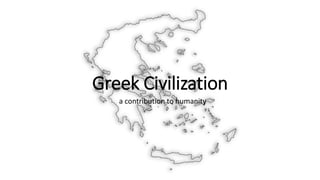
Greek civilisation
- 1. Greek Civilization a contribution to humanity
- 2. A Brief… • About 3000 BC, there lived on the island of Crete people now called Minoans. The name comes from their King Minos. • Minos and other Minoan kings grew rich from trade, and built fine palaces. The Minoan civilization ended about 1450 BC. • After the Minoans came the Myceneans. They were soldiers from mainland Greece, and were the Greeks who fought Troy in the 1200s BC. • After the Mycenean age ended, about 1100 BC, Greece entered a "Dark Age". This lasted until the 800 BC when the Greeks set off by sea to explore and set up colonies. • The Olympic Games begun in 776 BC. This was the start of "Archaic" Greek civilization. • Around 480 BC the "golden age" of Greece began. This is what historians call "Classical" Greece.
- 3. What was ancient Greece like? • Ancient Greece had a warm, dry climate, as Greece does today. • People lived by farming, fishing, and trade. • Some were soldiers. Others were scholars, scientists or artists. • There were beautiful temples with stone columns and statues, and open-air theatres where people sat to watch plays.
- 4. The Geographical Settings • Greece appears as though the sea has smashed it to pieces. Some pieces drifted away forming rocky islands. Others barely cling to the mainland. • Because of these shapes, Greece is a country made up of peninsulas – area of land surrounded by water on three sides. • Only about 1/5th of Greece is suitable for farming because most of the country is covered with mountains.
- 5. Effects of Greek’s Geography • Because travel was so difficult inland, Greeks turned to the seas on all sides. • The sea became a source of food as well as a way of trading with other communities. • They became skilled traders, shipbuilders and sailors. • The Greeks thought of themselves as separate countries because it was hard to get together.
- 6. Minoan Civilization • The Minoans lived on the island of Crete from about 3000 to 1100 BC. • Because of their location, they were excellent traders who controlled the Aegean Sea.
- 7. The Mycenaeans • After the Mycenaeans defeated the Minoans, the culture of the islands blended with mainland Greek culture. • At their height in 1400 BC, the Mycenaeans controlled trade, spoke an early form of Greek, and used writing.
- 8. Trading cultures developed in the Minoan and Mycenaean civilizations. Minoans • They spent much of their time at sea, trading in the Mediterranean. • Ships carried goods such as wood, olive oil, and pottery all around the eastern Mediterranean. • They became the victims of a huge volcano that erupted north of Crete. • They were not considered to be Greek, since they didn’t speak Greek. Mycenaeans • They were the first people to be considered Greek. • They lived inland and built fortresses. • They were more violent in their trade. • They took over Crete and became the major traders in the eastern Mediterranean. • They developed colonies in northern Greece and Italy, from which they shipped goods around the Mediterranean and the Black Sea.
- 9. The City-State Development • Historians believe that during Dark Age around 750 BC, villages joined with cities and began to develop their own traditions, laws, and governments. • The Greek word for city-state is polis. The creation of city-states marks the beginning of Greece’s classical age, an age marked by great achievements. • Greek city-states shared common culture and language, but choose different forms of government. Athens and Sparta were the largest city-states.
- 10. Aristocracy • The earliest rulers of city-states were probably chieftains or kings who were military leaders. • By the end of the Dark Ages, most city-states were ruled by aristocrats(members of rich and powerful families). • Because they were wealthy, aristocrats could afford land, chariots, and the best weapons that helped make themselves stronger.
- 11. The Tyrants • As the Greeks sailed to ports to trade various goods, the city-states became wealthy. A middle class of merchants and sailors developed. • The middle class wanted representation in government and began to equip themselves with armor, swords, and spears. • Gradually power shifted from the aristocrats to tyrants – rulers who seize power by force.
- 12. Democracy in Greece • Eventually the people in city-states overthrew the tyrants. Some city- states developed a style of government called democracy – citizens govern themselves. • The most successful democratic city-state was Athens. • Athenian democracy became the leading government of the ancient world.
- 13. Invasions • In the early 5th century B.C., Greece was invaded by Persia (now Iran). Athens and Sparta joined forces. The Greeks won. • Decades later Athens & Sparta fought each other in the Peloponnesian War. The Spartans won. • The city-states were so busy focusing on the war between Sparta and Athens they didn’t notice their neighbor Macedonia was building an army to invade Greece. • Alexander the Great from Macedonia invaded Greece and conquered territories from North Africa, Middle East and Asia spreading Greek culture.
- 14. The End of Democracy in Athens • Athens was conquered by the Macedonians and fell under their influence. • The king ruled like a dictator. No one could make decisions without his approval. • The assembly still met to make laws, but it had to be careful not to upset the king. • Eventually, a new king (Demetrius I) took over and frees Athens from the tyrant Demetrius of Phaleron.